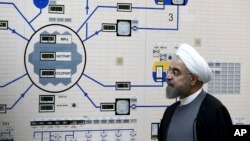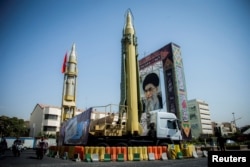The U.S. says it had constructive talks with its European partners last week on changes to the Iran nuclear agreement, but it is making contingency plans in case the talks fail and President Donald Trump decides to pull out of the landmark 2015 deal.
Lead negotiator and State Department Policy Planning Director Brian Hook told reporters Wednesday he cannot predict whether U.S. talks with Britain, France and Germany on forging a supplemental agreement to address what Trump sees as deficiencies in the Iran nuclear agreement can meet a May deadline.
May 12 is when the Trump administration is supposed to decide whether to extend sanctions relief on Tehran, as stated in the Iran nuclear agreement. That pact is also known as the Joint Comprehensive Plan of Action, or JCPOA.
Hook briefed reporters during a conference call about his meetings late last week with European allies in Berlin.
"We have had constructive talks with the Europeans ... but I can't predict whether we will reach an agreement with them or not," Hook said. "We always have to prepare for any eventuality, and so we are engaged in contingency planning because it would not be responsible not to."
Trump told diplomats to seek new restrictions on Iran's ballistic missile program, more intrusive inspections of its nuclear facilities, and the elimination of so-called "sunsets" on restrictions on Iranian nuclear activities.
Hook conceded Tehran is in what he termed "technical compliance" with the terms of the Iran nuclear agreement, but pointed to what he called a shift in policy, saying the Trump administration is taking into consideration the totality of Iran's actions in the world, including its support for terrorism.
Iranian representatives have complained that U.S. threats to leave the deal are scaring away investors and hurting Iran's economy. Iran is rejecting any changes, but European diplomats have indicated they would support some changes to try to salvage the deal.
Hook said he met with Iranian negotiators in Vienna, where they discussed the fate of American citizens still held in Iran in a meeting he requested.
Asked what kind of message the U.S. unilaterally pulling out of the Iran nuclear deal would send to North Korea at a moment when Trump has agreed to meet with Kim Jong Un, Hook said no one has "moved the goal post" (changed its positions) or negotiated in bad faith more than the North Korean in decades of negotiations over its nuclear program.
Asked about the selection of CIA Director Mike Pompeo to be the new Secretary of State, Hook said Pompeo would be well equipped to deal with the Iran nuclear deal and a range of other issues. He said that if Pompeo is confirmed by the Senate, it would be "a very easy transition."
Pompeo has said he would like to see the Iran nuclear deal scrapped. Republican Senate Foreign Relations Committee Chairman Bob Corker said Sunday he believed that Trump will soon cast the deal aside.





